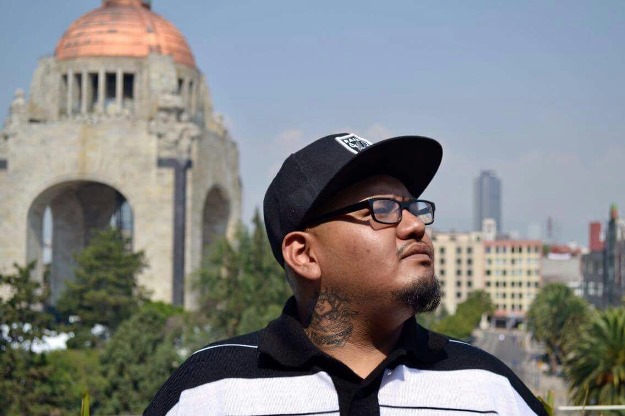This article has been updated
It didn’t feel much like a homecoming when Luis Fernando Ortiz, 22, stepped off the plane in Mexico City after a decade away. His wrists and ankles were rubbed raw, chained for the duration of a 12-hour journey by bus and plane from Kentucky. His car, apartment, and family – wife, step-children, parents and siblings – were thousands of miles away.
“You have to start your life again with a couple of items in a plastic bag,” said Ortiz, who was deported from the U.S. and arrived in Mexico on January 23 with nothing but a change of clothes, a toothbrush, deodorant and his identification.
Ortiz had crossed the border into the U.S. with his family, but without papers, when he was ten years old. He was in the final stages of receiving Deferred Action for Childhood Arrivals (DACA) status, which would have allowed him to stay legally in the U.S., when a marital dispute reported by neighbors led to a month in county jail. While his wife never pressed charges, he was handed over to Immigration and Customs Enforcement (ICE). Eight months later – three days after U.S. President Donald Trump’s election – he was deported to a country he barely knew.
Despite concerns of mass deportations under Trump, recent reports show that there have been fewer so far than under Obama. The first four months of the Trump administration saw 27,000 fewer deportations of Mexicans than the same period of 2016 under Obama, according to Mexico’s National Institute of Migration. The Department of Homeland Security shows a similar trend in overall deportations. This suggests the gulf in immigration policy between the two presidents may be wider in rhetoric than it is in fact.
But analysts – and cases like Ortiz’s – indicate that looking at the numbers alone can be misleading. There has been a significant change in who is deported – with significant consequences for families on both sides of the border.
The drop in the number of deportees can be ascribed in part to changes in enforcement at the border, where apprehensions are the main driver of removals. Between January and April of this year, total apprehensions on the U.S.-Mexico border decreased by 69 percent, according to the Migration Policy Institute (MPI).
“People are deciding not to come here,” Faye Hipsman, policy analyst at MPI, told AQ. “That is likely the result – whether it’s reality or perception – that it’s become a lot more difficult to cross the border.”
While the number of deported Mexicans who indicated they would try to re-enter the U.S. had already dropped by 80 percent between 2005 and 2015, experts say Trump’s anti-immigrant rhetoric has further dissuaded deportees from trying to return to the U.S..
“A lot less people want to live in the U.S. today because they are afraid,” said Eunice Rendón of Agenda Migrante, a Mexico-based NGO that brings leading experts together to discuss migration issues.
There’s also been a change in deportation priorities. Ortiz was among the first deportees of the Trump administration, but he is also an example of the new population being targeted. A growing number of immigrants like him are being sent back to their home country after spending years, in some cases a lifetime, in the U.S.
Many, including Ortiz, no longer call their birth country home, prefer speaking English over Spanish and arrive in Mexico without a job or resources. Ortiz had to spend two weeks living with an aunt before he could move out on his own.
The changing profile of Mexican deportees is a direct result of Trump’s decision to roll back immigration policies put in place by both Obama and former President George W. Bush. While the Obama administration prioritized deporting undocumented immigrants with a criminal history, Trump has directed customs and immigration authorities to aggressively pursue violators of immigration law itself, expediting deportations and handing more power over to local authorities in the process.
This means that the deportations that are happening take place farther from the border, where immigrant communities are more likely to be more settled, according to Hipsman.
“They’re more likely to have lived here for a long time, and have kids here,” she said.
Israel Concha has seen the effects of these changes firsthand. A former deportee himself, he established an organization, New Comienzos, that helps mentor Mexicans during the process of repatriation. Because many of the returning immigrants had no connections in their home country anymore, they need far more support, and the organization’s work load has tripled since the beginning of this year, he said.
“Now we’re seeing more people that are deported and have not committed a crime,” Concha told AQ. “It’s a humanitarian crisis in my eyes.”
Other organizations in Mexico are also turning their attention from migrants trying to leave the country to those who are returning and having trouble reintegrating into Mexican society, said Rendón.
The Mexican government is aware, and responding with new initiatives to help repatriated Mexicans, including an education law that would help students transfer credits and integrate into Mexican universities, and a return migration law that would help repatriating Mexicans access resources and find jobs.
“People and institutions are starting to think about what they can do to help,” said Rendón.
While the full measure of Trump’s immigration policy remains to be seen, the changing profile of returnees has already resulted in broken families, like Ortiz’s, and left deportees like him to make a life for themselves in what is essentially a foreign land.
This article was updated to clarify that data provided by Mexico’s National Institute of Migration covers only Mexican migrants. A reference to the overall drop in deportations from the U.S. was also added.
—
Bintrim is an editor for Americas Quarterly








